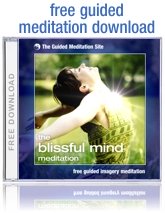For Lovers of Meditation
Meditation Instructions
Part 3 - The Experience of Meditation
Welcome to part 3 in this series of meditation instructions. In this article I will discuss what the actual experience of meditation is like, and how to avoid some of the most common problems that beginners fall victim to.
Guess What? You're Meditating!
OK - so there are probably still a few thoughts rolling around in your head, perhaps more than a few, but that's perfectly OK at this stage.
Often when people are learning how to meditate they assume that meditating means absolute mental silence. Sure enough, the ultimate goal of meditation is to achieve mental silence, but meditation is the process of journeying towards this silence, and some thoughts are a natural part of that journey.
One of the main reasons why people sometimes give up on learning how to meditate is because they mistakenly believe that they have to "not think anything". You don’t need to be perfect to experience the benefits of meditation!
Think of it this way. Imagine that I asked you to stand on one foot and balance for the next 20 minutes. You would almost certainly wobble and move about during that time, but as long as you kept one foot off the ground you could truthfully declare, "I am standing on one foot".
Thoughts are just wobbles in your meditation, and they are to be expected. Unfortunately, there are no magical meditation techniques or meditation exercises that can stop you from thinking entirely, but over time you will find it easier and easier to balance your mind and remain still. Just follow these meditation instructions and you'll be well on your way to experiencing wonderful deep meditation.
Becoming Transcendent
As you meditate you will gradually experience a deepening sensation of relaxation. Sometimes it may feel like you are falling asleep, but you will still be alert, you will still be conscious and aware, but your thoughts will seem like a distant echo that comes and goes.
This is transcendence.
When you detach from your thoughts and observe them rather than engaging with them and reacting to them, you have reached a transcendental state of meditation. It’s a peaceful and serene experience, and it can also feel very freeing and blissful. You will feel as though you have connected with a silent awareness inside you...the real you.
You will realize that all the mental activity that you are preoccupied with during the day is not who you really are. In truth, you are the silent witness of your thoughts.
Internal Uprisings!
Sometimes when you meditate it may seem as though your thoughts become LOUDER instead of quiter, and that your mind is even more active during meditation than it is during the day.
It just seems this way. Your mind will actually be slowing down as you meditate, but your awareness of your thoughts may increase.
When you meditate, you may become the observer of your thoughts and if your mind seems to be very active, it’s just because you are now noticing this mental business in a more vivid way. Give it a little time. Stick with the mantra and gradually the thoughts will dissipate.
Occasionally you may feel some emotional discomfort during your meditation. You can be sure that it is not the meditation that is causing this! If you feel an emotion rising up within you, such as anger or distraction or sadness or any other physical or emotional discomfort, it is because your meditation is giving you the opportunity to release the stresses and strains that you have absorbed during your life.
Perhaps an uncomfortable memory will pop into your mind, or a general feeling of irritation may arise.
Please remember that these feelings are temporary. Sometimes you may feel like you want to stop your meditating prematurely if you feel uncomfortable, but if you quit the meditation then you will just be running away from something that is already inside you that needs to be released.
One of the great benefits of meditation is that it can help you to release negative emotions that are trapped in your subconscious. All of us have these emotions in one form or another, but we often find them difficult to free ourselves from them.
Meditation is a fantastic way for you to release negativity and in doing so you will find yourself becoming more and more happy and balanced in your daily life. If you feel an uncomfortable emotion rising up within you during meditation then keep the following in mind:
1. Do not try to suppress the feeling, even if it is uncomfortable. Trying to avoiding it will not make it go away and can actually cause it to persist.
2. Continue to meditate and simply "allow" the feelings to be. Given time, they will gradually dissipate on their own without any effort on your part.
3. If the emotions build and become so strong that you feel as though you want to release them, then do so! If tears well up in your eyes, then congratulate yourself for being confident and patient enough to face the feeling you are having. You are releasing an emotion that was locked up inside you. Better out than in!
Most of the time you will find that meditation is a beautiful and deeply relaxing experience, and while emotional releases like this are not something you should expect to happen every time you meditate, it is important that you understand how to deal with them if they do occur. These meditation instructions would simply not be complete without some instruction on how to deal with "internal uprisings" as I call them. The emotional releases that sometimes takes place during meditation are very natural and very healing.
Sometimes you will find it easy to concentrate on your breathing or your mantra, and at other times you may feel like your mind is overloaded with thoughts. This is all OK. Try not to judge one meditation as bad, and another as good. As time goes by you will find it easier and easier to let go of thoughts and to experience a state of deep meditation.
Don't miss the final meditation lesson in this series! Read on to learn how to end a meditation properly, and what to expect in the long term in
Meditation Instructions Part 4 - Finishing up and Making Progress
Click to return from Meditation Instructions to the How to Meditate main page
This article is copyright protected, however you may republish it online or in print media provided that you include the following credit, including the active link:
Article by Christopher Lloyd Clarke from www.The-Guided-Meditation-Site.com.


